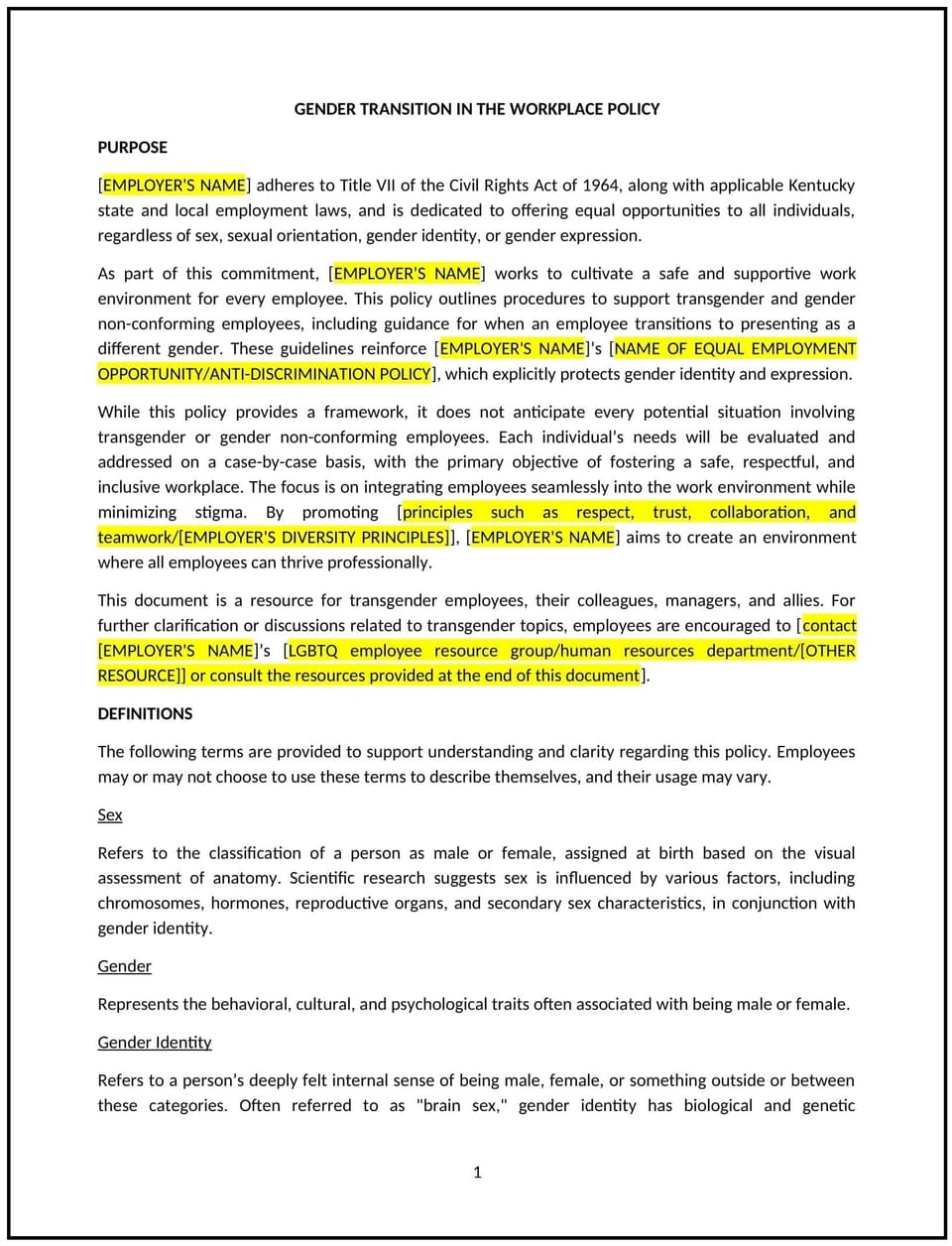Gender transition in the workplace policy (Kentucky): Free template

Gender transition in the workplace policy (Kentucky)
A gender transition in the workplace policy provides Kentucky businesses with clear guidelines for supporting employees through gender transition. This policy outlines the procedures and support available to employees undergoing gender transition, ensuring a respectful, inclusive, and safe work environment for all.
By adopting this policy, businesses can demonstrate a commitment to diversity, equity, and inclusion while fostering a supportive atmosphere for employees through personal transitions.
How to use this gender transition in the workplace policy (Kentucky)
- Define gender transition: Clearly explain what gender transition involves, such as changing gender identity, pronouns, or presentation, and outline how the workplace can support employees during this process.
- Ensure privacy and confidentiality: Emphasize the importance of maintaining confidentiality throughout the transition process, including information related to the employee's gender identity and medical history.
- Set procedures for notifying the workplace: Provide guidelines for how employees can inform their manager or HR about their gender transition, including any necessary adjustments to their work environment, duties, or benefits.
- Address name and pronoun usage: Establish procedures for updating employee records to reflect new names and pronouns, ensuring that all workplace communications and interactions are respectful.
- Provide workplace accommodations: Outline reasonable accommodations that may be requested, such as adjustments to uniforms, restrooms, or locker rooms, to support employees during their transition.
- Establish support resources: Ensure that employees have access to resources, such as counseling services, external organizations, or employee resource groups, that can help them through their transition.
- Include anti-discrimination measures: Reinforce the company’s commitment to preventing discrimination, harassment, or bias against employees undergoing gender transition, and provide clear processes for reporting and addressing violations.
Benefits of using this gender transition in the workplace policy (Kentucky)
This policy provides several key benefits for Kentucky businesses:
- Fosters an inclusive culture: Encourages a respectful and supportive work environment where all employees, including those undergoing gender transition, feel valued.
- Enhances employee retention: Provides a safe and welcoming space for employees to transition, increasing job satisfaction and reducing turnover.
- Promotes diversity and inclusion: Demonstrates the business’s commitment to diversity and creates a more inclusive environment for all employees.
- Reduces legal risks: Helps the business comply with anti-discrimination laws and regulations related to gender identity and ensures a fair, respectful treatment of all employees.
- Strengthens reputation: By supporting gender transition, the business establishes itself as a forward-thinking and inclusive organization, improving its reputation with employees, clients, and the public.
Tips for using this gender transition in the workplace policy (Kentucky)
- Communicate the policy: Make the policy available to all employees and ensure that managers and HR are trained to handle gender transition situations with respect and sensitivity.
- Foster open dialogue: Create an environment where employees feel comfortable discussing their gender identity and transition, and provide support throughout the process.
- Review workplace accommodations: Regularly assess whether accommodations such as restroom access or uniform requirements are necessary, and address any concerns proactively.
- Promote inclusivity in all areas: Encourage inclusivity in recruitment, training, and day-to-day operations to ensure that the workplace remains a safe and supportive environment for everyone.
- Review periodically: Update the policy as needed to reflect changes in Kentucky laws, federal regulations, or best practices for supporting gender transition in the workplace.
Q: What is the purpose of a gender transition in the workplace policy?
A: The policy provides guidelines for supporting employees undergoing gender transition, ensuring a respectful, inclusive, and safe work environment within the business.
Q: How does the business maintain confidentiality during a gender transition?
A: The business ensures that any information related to an employee’s gender identity, medical history, or transition process is kept confidential and shared only with necessary personnel.
Q: What accommodations can be requested during a gender transition?
A: Accommodations may include adjustments to uniforms, restroom facilities, or work environment, as well as support for name and pronoun usage.
Q: How does the business address name and pronoun changes?
A: The business updates employee records and ensures that all workplace communications and interactions reflect the employee’s new name and pronouns.
Q: What resources are available for employees undergoing a gender transition?
A: The business provides access to counseling services, employee resource groups, and external organizations that can assist employees during their transition.
Q: How does the business handle discrimination or harassment related to gender transition?
A: The business is committed to preventing discrimination or harassment and provides clear procedures for reporting and addressing such issues.
Q: How often should the gender transition in the workplace policy be reviewed?
A: The policy should be reviewed regularly to ensure it remains aligned with changes in Kentucky laws, federal regulations, and the business’s commitment to diversity and inclusion.
Q: How can businesses promote inclusivity for all employees?
A: Businesses can create an inclusive environment by training employees, providing support, updating policies, and actively encouraging diversity in all workplace practices.
This article contains general legal information and does not contain legal advice. Cobrief is not a law firm or a substitute for an attorney or law firm. The law is complex and changes often. For legal advice, please ask a lawyer.


